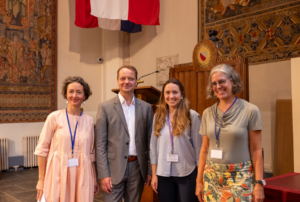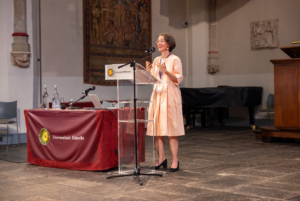The GLOBALGOALS2024 Conference focused on the science-policy interface on the Sustainable Development Goals (SDGs), bringing together researchers and scholars from all over the world to discuss the future direction of the SDGs and the 2030 Agenda.

From left to right: Prof. Anna-Katharina Hornidge, Prof. Frank Biermann, Alexia Faus Onbargi and Prof. Ines Dombrowsky following the GLOBALGOALS2024 Conference opening plenary. Photo by GLOBALGOALS2024.
IDOS co-hosted the international academic conference, which took place from 29 to 30 August at Utrecht University in the Netherlands. The two-day event culminated in a Conference Statement that was presented at the UN Summit of the Future on 22-23 September in New York. Prof. Frank Biermann, director of the GLOBALGOALS project, opened the Conference with some reflections on the limited political impact of the SDGs. This prompting broader discussion on whether the SDGs should be extended until 2050 to enable their full realisation.
IDOS Director, Prof. Anna-Katharina Hornidge, delivered a keynote speech titled ‘International Sustainability Politics in a Time of Global (Dis-)Order’, showcasing the complex and volatile socio-political context in which the SDGs operate, particularly in a year of major elections across the globe. She discussed the important role of winning majorities in democratic processes for a global sustainability agenda, and specifically also the Agenda 2030.
With reference to the most recent elections within the European Union, in several member states, and globally, she argued that the recent decline in political rhetoric and strategy development surrounding the 2030 Agenda (particularly at the level of the European Commission) calls for critical reflection within the scientific community. This reflection should address the balance between conducting thorough analyses, such as examining the structural determinants of the 2030 Agenda’s implementation, and the scientific community’s contributions to the overall narrative on the 2030 Agenda’s performance.

Prof. Anna-Katharina Hornidge delivering her keynote speech on ‘International Sustainability Politics in a Time of Global (Dis-)Order’. Photo by GLOBALGOALS2024.
Her keynote ended with a clear call for policy-making that understands and cherishes the 2030 Agenda as a global cooperation agenda and invests into its implementation (with the EU playing a special role here). In the direction of the scientific community, Prof. Hornidge pointed to the role of scientifically-grounded work at the science-policy-interface that offers constructive means to ensuring that it is indeed possible in democratically organised systems to win elections with a transformative sustainability agenda as political programme.
Prof. Ines Dombrowsky, a member of the GLOBALGOALS2024 International Steering Committee, chaired a semi-plenary on ‘Differentiation and Dynamisation of the SDGs’, which addressed some of the major challenges to accelerate the implementation of the SDGs, including the politics that can drive or inhibit policy coherence across the 17 Goals. She also presented her own research as part of the SHAPE project, titled ‘Policy Mixes for Sustainable Development Pathways: Representation in Integrated Assessment Models’. The paper shows how the Sustainable Development Pathway scenarios use policy mixes to constrain negative side-effects of unmitigated climate measures to achieve several SDGs simultaneously.
IDOS researcher Dr Marcelo Inacio da Cunha presented his research under the Klimalog project on ‘Rights-based access for leaving no biodiverse area nor anyone behind: Deliberative protected area councils in Amazônia’. The presentation focused on institutions governing conservation and resource access by forest peoples, and levers for moving from consultations by environmental entities with Local Communities, towards deliberative joint management in protected areas of Amazônia.
Within the research on the science-policy interface (SPI), Sarah Löpelt, IDOS researcher, presented initial results of the accompanying research as part of the Science Platform Sustainability 2030 (wpn2030). Her presentation focused on the ‘Transformative Idea’ of the DNS-Lab, an innovative format developed by wpn2030 that aims to co-create integrated knowledge at the SPI for the German Sustainable Development Strategy (DNS) in an agile manner.
Finally, IDOS researcher Alexia Faus Onbargi, whose PhD under the ClimEQ project is being supervised by both Ines Dombrowsky and Frank Biermann, presented some of her main findings on Just Transition (JT) preferences and views held by participants at a survey issued at COP28 in Dubai. Main insights here include strong preferences to integrate sustainable development, eradicating poverty and ensuring equality of opportunities into JT policy, as well as promoting policy coherence for JT governance, raising the question of whether the SDGs are in fact the best way to advance JTs.
